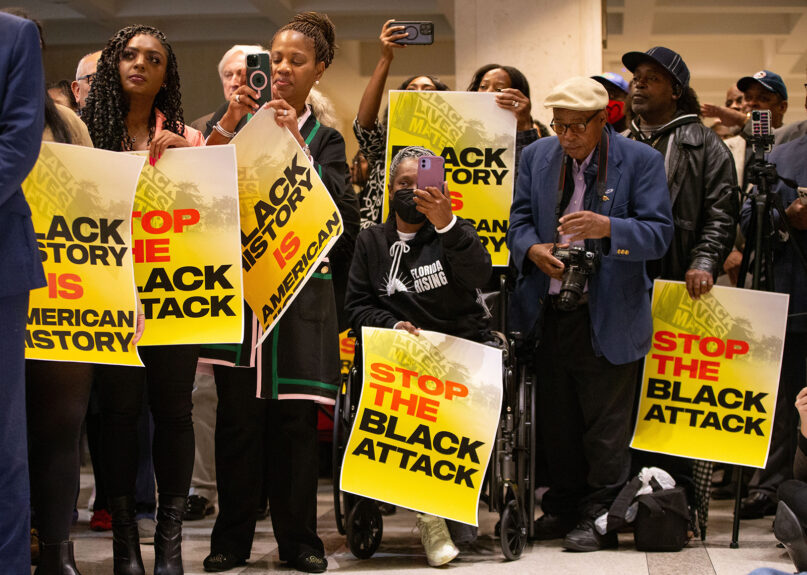(RNS) — When we think of civil rights struggles of the past, we summon visions of revolutionary, suit-clad clergy leading throngs of ordinary, organized, outraged people through the streets in protest against white supremacy. After developments in Florida in recent weeks, you can instead imagine a vanguard of high-schoolers in sweatshirts and backpacks.
Florida Gov. Ron DeSantis’ decision to ban a pilot Advanced Placement course in African American studies in the state’s schools was driven not only by his usual imagined threat of critical race theory infecting students. In a Jan. 23 press conference, the Florida governor doubled-down on the Black history ban by labeling the course a Trojan horse for woke “indoctrination.”
“This course, when I heard it, didn’t meet the standards. I figured, ‘Yeah, they may be doing CRT,’” DeSantis said. “It’s way more than that. This course on Black history, what’s one of the lessons about? Queer theory. Now, who would say that an important part of Black history is queer theory? That is somebody pushing an agenda on our kids. When you look you see they have stuff about intersectionality, abolishing prisons, that’s a political agenda.”
The ban has spurred a movement led by Black religious leaders and historians who want to foster “learning about all people’s history.”
“We urge my beloved governor of Florida and the Florida Department of Education to not diminish, dismantle and destroy the teaching of Black studies and do more research about the power of diversity, equality and inclusion,” said the Rev. R.B. Holmes Jr. at a rally the same day that the governor spoke.
While it’s heartening to see clergy in the mix, churches aren’t positioned to mount the most powerful responses to DeSantis’ efforts to prevent adequate education on race. Students and their teachers have the most potential to push back against this instance of white supremacy. If they are empowered to take action, their resistance could become the groundswell for another nationwide shift in America’s consensus on race through nonviolent struggle. Their noncooperation could do the most to disrupt the flow of racist power.
Conservative anti-woke efforts are animated by a paternalistic attitude, as authorities position themselves as champions of children and families. See, for instance, DeSantis’ racist “Stop W.O.K.E.” Act (“wrongs against our kids and employees”), which superfluously bans teaching of critical race theory in the workplace and K-12 schools. His ban against the AP course similarly appeals to parents who feel their children are too young to know what’s good for them, meanwhile erasing LGBTQ people in Black history by calling out “queer theory.”
Students have the power to legitimize or delegitimize these claims by expressly stating what their interests actually are. Today’s students want an accurate and thorough education in American history, which, yes, includes Black queer freedom fighters and prison abolitionists. Students can make their desires clear through rallies, protests, open letters and other demonstrations, thereby removing the basis for DeSantis’ arguments.
Furthermore, if students remove their consent to be “protected” from inconvenient history through such civil disobedience tactics as school boycotts or lock-ins, lunchtime or gymtime teach-ins and other creative actions, they could pressure the administration to meet their demands and inspire their parents and teachers to take on supportive roles. Children demanding to be told the truth makes them sympathetic characters; attempts to intimidate them into compliance are likely to backfire.
The community could support the students’ action by bringing food, changes of clothes, and toothbrushes, as parents did in 2021 when students at an elite Bronx school protested the “culture of bias” that prevailed there. If the movement escalates to the point where teachers feel comfortable striking or engaging in other forms of resistance, they need to know that the community (or, best case scenario, a union) will take care of them.
This brings me back to churches. Students will need allies from all sectors of the community, and churches are poised to be among those allies. They can offer their buildings for rallies, strategy sessions and trainings. They can collect offerings to help raise funds to make signs and posters for rallies. They can set up a communications network if any protest efforts result in arrests or violent reprisals from the police. The possibilities are many.
To be sure, the Black church has historically held a prominent place in Black freedom struggles in the past. But in this scenario, the fight hasn’t come to the door of the churches, but to the schoolhouse.
As the rebellious (though disgraced) Pastor James Bevel once said to Martin Luther King Jr. about the kids in Birmingham: “If they’re old enough to get saved at your church, they’re old enough to march.”






